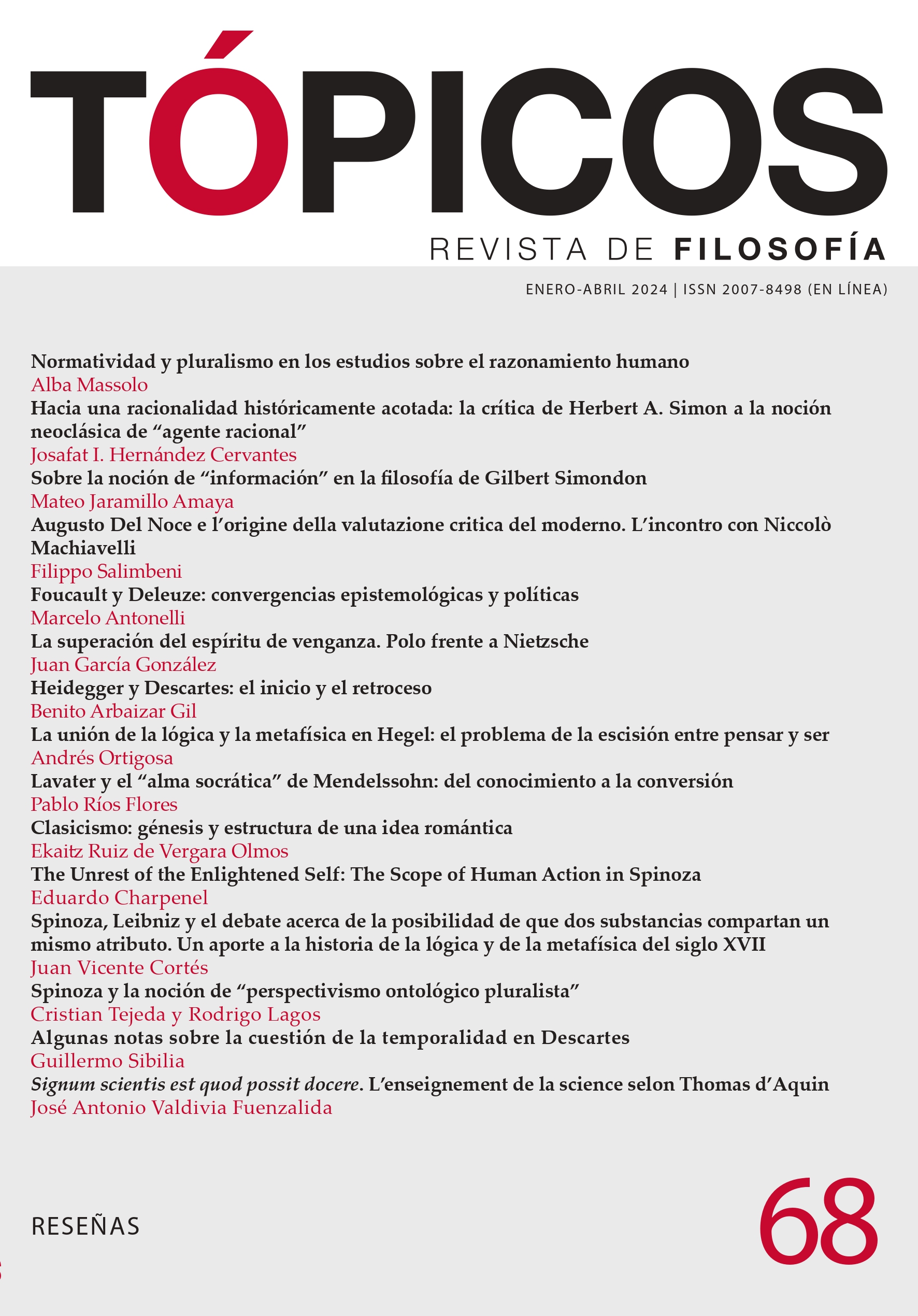Publicado 2023-12-07
Palabras clave
- diversidad,
- distinción,
- atributos,
- substancias,
- Spinoza
- Leibniz ...Más
Derechos de autor 2023 Tópicos, Revista de Filosofía

Esta obra está bajo una licencia internacional Creative Commons Atribución-NoComercial-SinDerivadas 4.0.
Cómo citar
Resumen
El presente trabajo se propone examinar la objeción de Leibniz a E1p2 y E1p5 y responder a ella. La objeción es conocida: es falso, según Leibniz, que dos substancias de atributos diversos no tengan nada en común (i. e., E1p2) y, por consiguiente, que en la naturaleza no puedan darse dos o más substancias de mismo atributo (i. e., E1p5). Defiendo que E1p2 y, por tanto, E1p5 resisten a la objeción de Leibniz. Para ello, abordo, primero, el sentido y la función de E1p2 a fin de determinar dos posibles contextos en que la demostración es válida: el contexto delimitado por la doctrina cartesiana del atributo principal y el contexto escolástico de la doctrina lógica de la diversidad esencial. Segundo, examino la objeción de Leibniz, con lo que determino de manera más precisa el marco epistémico tanto de E1p2d como de la objeción de Leibniz. Tercero, propongo un análisis crítico de la objeción de Leibniz a fin de mostrar que, si bien esta objeción tiene cierta apariencia de validez, si consideramos únicamente lo enunciado por Spinoza en las definiciones y axiomas anteriores a E1p2, esta entraña una contradicción. Por último, indico el punto de mayor dificultad en la demostración de E1p2 para proponer una pequeña rectificación a fin de volverla inmune a la objeción de Leibniz.
Descargas
Referencias
- Allison, H. E. (1987). Benedict de Spinoza: An Introduction. Yale University Press.
- Aristóteles. (1982). Tratados de lógica (Organon). I. Categorías. Tópicos. Sobre las refutaciones sofísticas. M. Candel Sanmartín (trad.). Gredos.
- Aristóteles. (1998). Metafísica. V. García Yebra (trad.). Gredos.
- Audié, F. (2005). Spinoza et les mathématiques. Presses de l’Université de Paris-Sorbonne.
- Bennett, J. (1984). A Study of Spinoza’s Ethics. Hackett.
- Beyssade, J.-M. (1996). La théorie cartésienne de la substance. Equivocité ou analogie ? Revue internationale de philosophie, 195(1), 51-72.
- Burgersdijk, F. (1640). Institutionum metaphysicarum libri duo. Apud Hieronymum de Vogel.
- Burgersdijk, F. (1660). Institutionum logicarum libri duo. Apud Ægidium Valckenier et Casparum Commelinum.
- Carriero, J. (1995). On the Relationship between Mode and Substance in Spinoza’s Metaphysics. Journal of the History of Philosophy, 33(2), 245-273.
- Curley, E. (1969). Spinoza’s Metaphysics: An Essay in Interpretation. Harvard University Press.
- Curley, E. (1988). Behind the Geometrical Method. Princeton University Press.
- Deleuze, G. (1968). Spinoza et le problème de l’expression. Éditions de Minuit.
- Della Rocca, M. (2008). Spinoza. Routledge.
- Descartes, R. (1973). Œuvres de Descartes. VII. Meditationes de Prima Philosophia. C. Adam y P. Tannery (eds.). CNRS-Vrin.
- Descartes, R. (1987). Œuvres de Descartes. VIII-1. Principia Philosophia.. C. Adam y P. Tannery (eds.). Nueva presentación a cargo de B. Rochot. CNRS-Vrin.
- De Sevilla, I. (2006). Liber differentiarum II. M. A. Andrés Sanz (ed.). Brepols.
- Donagan, A. (1989). Spinoza. University of Chicago Press.
- Foucault, M. (1969). Archéologie du savoir. Gallimard.
- Freudenthal, J. (1887). Spinoza und die Scholastik. En E. Zeller, Philosophische Aufsätze. Eduard Zeller zu seinem fünfzigjährigen Doktor-Jubiläum gewidmet. (pp. 83-138). Fues Verlag.
- Garrett, D. (1990). Ethics IP5: Shared Attributes and the Basis of Spinoza’s Monism. En M. Kulstad y J. A. Cover (eds.), Central Themes in Early Modern Philosophy. (pp. 69-108). Hackett.
- Garrett, D. (2018). Nature and Necessity in Spinoza’s Philosophy. Oxford University Press.
- Gueroult, M. (1968). Spinoza. I. Dieu. Éditions Aubier-Montaigne.
- Hallet, H. F. (1957). Benedict de Spinoza: The Elements of his Philosophy. The Athlone Press.
- Heereboord, A. (1665) Meletemata philosophica. Apud Johannem Ravesteinium.
- Heereboord, A. (1680). Hermeneia logica seu Explicatio Synopseos Logicæ Burgersdicianæ. Ex Officina Joan. Hayes.
- Laerke, M. (2018). Leibniz’s Encounter with Spinoza’s Monism, October 1675 to February 1678. En M. Della Rocca (ed.), The Oxford Handbook of Spinoza. (pp. 434-463). Oxford University Press.
- Laerke, M. (2012). Spinoza’s Monism? What Monism? En P. Goff (ed.), Spinoza on Monism. (pp. 244-261). Palgrave Macmillan.
- Leibniz, G. W. (1978). Die Philosophischen Schriften von G. W. Leibniz. I. C. Gerhardt (ed.). Georg Olms Verlag.
- Macherey, P. (1994). Spinoza est-il moniste ? En M. Revault D’Allonnes y H. Rizk (eds.), Spinoza. Puissance et Ontologie. (pp. 39-53). Éditions Kimé.
- Macherey, P. (1998). Introduction à l’Éthique de Spinoza. La première partie, la nature des choses. Presses Universitaires de France.
- Marion, J.-L. (2002). Questions cartésiennes. II. Sur l’ego et Dieu. Presses Universitaires de France.
- Melamed, Y. (2009). Spinoza’s Metaphysics of Substance: The Substance-Mode Relation as a Relation of Inherence and Predication. Philosophy and Phenomenological Research, 78(1), 17-82.
- Mignini, F. (1995). L’Etica di Spinoza. Introduzione alla lettura. Carocci Editore.
- Spinoza, B. (1677). Opera posthuma. J. Rieuwertsz.
- Spinoza, B. (1925). Opera. IV. Epistolae. C. Gebhardt (ed.). Carl Winter.
- Spinoza, B. (2020a). Ética demostrada según el orden geométrico. P. Lomba (ed. y trad.). Trotta.
- Spinoza, B. (2020b). Œuvres IV. Ethica. Éthique. F. Akkerman, P. Steenbakkers y P.-F. Moreau (eds.). P.-F. Moreau (trad.). Presses Universitaires de France.
- Spinoza, B. (1985). Collected Works of Spinoza. I. E. Curley (ed. y trad.). Princeton University Press.
- Suárez, F. (1963). Disputaciones metapfísicas. S. Rábade, S. Caballero y A. Puigcerver (eds. y trads.) Gredos.
- Van Reyen, J. B. M. (1993). Burgersdijk, Logician or Textbook Writer? En E. P. Bos y H. A. Krop (eds.), Franco Burgersdijk (1590-1635). Neo-Aristotelianism in Leiden. (pp. 9-28). Rodopi.
- Wolfson, H. A. (1934). The Philosophy of Spinoza. I. Cambridge University Press.





